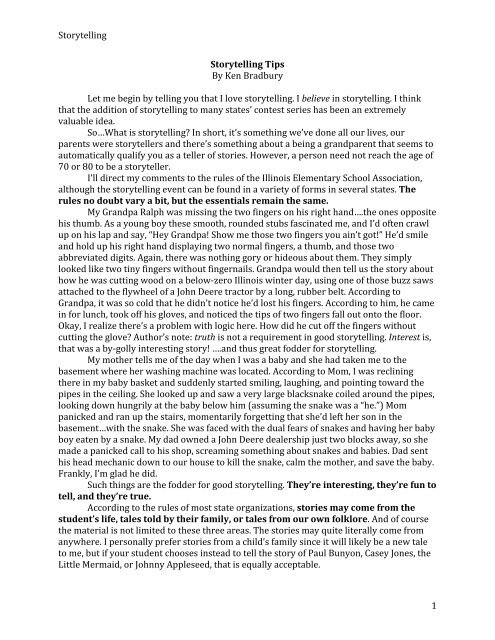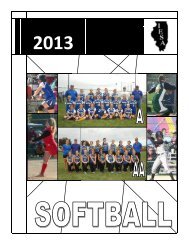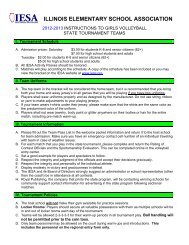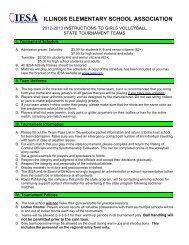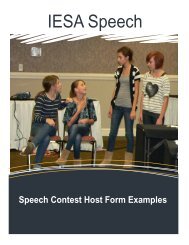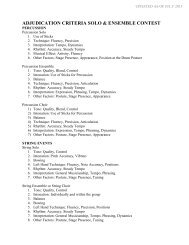Storytelling 1 Storytelling Tips By Ken Bradbury Let me begin by ...
Storytelling 1 Storytelling Tips By Ken Bradbury Let me begin by ...
Storytelling 1 Storytelling Tips By Ken Bradbury Let me begin by ...
You also want an ePaper? Increase the reach of your titles
YUMPU automatically turns print PDFs into web optimized ePapers that Google loves.
<strong>Storytelling</strong><br />
<strong>Storytelling</strong> <strong>Tips</strong><br />
<strong>By</strong> <strong>Ken</strong> <strong>Bradbury</strong><br />
<strong>Let</strong> <strong>me</strong> <strong>begin</strong> <strong>by</strong> telling you that I love storytelling. I believe in storytelling. I think<br />
that the addition of storytelling to many states’ contest series has been an extre<strong>me</strong>ly<br />
valuable idea.<br />
So…What is storytelling? In short, it’s so<strong>me</strong>thing we’ve done all our lives, our<br />
parents were storytellers and there’s so<strong>me</strong>thing about a being a grandparent that seems to<br />
automatically qualify you as a teller of stories. However, a person need not reach the age of<br />
70 or 80 to be a storyteller.<br />
I’ll direct my com<strong>me</strong>nts to the rules of the Illinois Ele<strong>me</strong>ntary School Association,<br />
although the storytelling event can be found in a variety of forms in several states. The<br />
rules no doubt vary a bit, but the essentials remain the sa<strong>me</strong>.<br />
My Grandpa Ralph was missing the two fingers on his right hand….the ones opposite<br />
his thumb. As a young boy these smooth, rounded stubs fascinated <strong>me</strong>, and I’d often crawl<br />
up on his lap and say, “Hey Grandpa! Show <strong>me</strong> those two fingers you ain’t got!” He’d smile<br />
and hold up his right hand displaying two normal fingers, a thumb, and those two<br />
abbreviated digits. Again, there was nothing gory or hideous about them. They simply<br />
looked like two tiny fingers without fingernails. Grandpa would then tell us the story about<br />
how he was cutting wood on a below‐zero Illinois winter day, using one of those buzz saws<br />
attached to the flywheel of a John Deere tractor <strong>by</strong> a long, rubber belt. According to<br />
Grandpa, it was so cold that he didn’t notice he’d lost his fingers. According to him, he ca<strong>me</strong><br />
in for lunch, took off his gloves, and noticed the tips of two fingers fall out onto the floor.<br />
Okay, I realize there’s a problem with logic here. How did he cut off the fingers without<br />
cutting the glove? Author’s note: truth is not a require<strong>me</strong>nt in good storytelling. Interest is,<br />
that was a <strong>by</strong>‐golly interesting story! ….and thus great fodder for storytelling.<br />
My mother tells <strong>me</strong> of the day when I was a ba<strong>by</strong> and she had taken <strong>me</strong> to the<br />
base<strong>me</strong>nt where her washing machine was located. According to Mom, I was reclining<br />
there in my ba<strong>by</strong> basket and suddenly started smiling, laughing, and pointing toward the<br />
pipes in the ceiling. She looked up and saw a very large blacksnake coiled around the pipes,<br />
looking down hungrily at the ba<strong>by</strong> below him (assuming the snake was a “he.”) Mom<br />
panicked and ran up the stairs, mo<strong>me</strong>ntarily forgetting that she’d left her son in the<br />
base<strong>me</strong>nt…with the snake. She was faced with the dual fears of snakes and having her ba<strong>by</strong><br />
boy eaten <strong>by</strong> a snake. My dad owned a John Deere dealership just two blocks away, so she<br />
made a panicked call to his shop, screaming so<strong>me</strong>thing about snakes and babies. Dad sent<br />
his head <strong>me</strong>chanic down to our house to kill the snake, calm the mother, and save the ba<strong>by</strong>.<br />
Frankly, I’m glad he did.<br />
Such things are the fodder for good storytelling. They’re interesting, they’re fun to<br />
tell, and they’re true.<br />
According to the rules of most state organizations, stories may co<strong>me</strong> from the<br />
student’s life, tales told <strong>by</strong> their family, or tales from our own folklore. And of course<br />
the material is not limited to these three areas. The stories may quite literally co<strong>me</strong> from<br />
anywhere. I personally prefer stories from a child’s family since it will likely be a new tale<br />
to <strong>me</strong>, but if your student chooses instead to tell the story of Paul Bunyon, Casey Jones, the<br />
Little Mermaid, or Johnny Appleseed, that is equally acceptable.<br />
1
<strong>Storytelling</strong><br />
So…What’s the difference between performing a monologue and telling a<br />
story? It’s mainly a matter of delivery:<br />
‐‐‐A monologue is <strong>me</strong>morized; a story is paraphrased. It may change a bit from<br />
telling to telling.<br />
‐‐‐A monologue has a few hard and fast rules; storytelling is more pliable.<br />
‐‐‐In a monologue the speaker often speaks as if he or she is playing another<br />
character; a storyteller most often plays himself.<br />
‐‐‐Monologues are often limited in the amount direct dialogue that may be used; in<br />
storytelling there are no such limits.<br />
‐‐‐A monologue is basically an acting event; a storyteller has a conversation with the<br />
audience.<br />
The rules in Illinois and several other states say that the event of storytelling may<br />
include audience participation. At least in Illinois, this is not a require<strong>me</strong>nt. After all, so<strong>me</strong><br />
stories simply to not lend themselves to audience response. The old shaman sitting around<br />
the campfire or the village chief used audience repetition as a teaching device, but your<br />
student need not include audience participation unless it seems appropriate. In fact, I’ve<br />
judged storytellers who asked the audience to respond with certain sounds or phrases and<br />
it has see<strong>me</strong>d very forced and awkward. <strong>Let</strong> your common sense guide you on this.<br />
As a teacher/speech coach, it’s your first job to explore the story possibilities with<br />
your students. Encourage them to plumb their <strong>me</strong>mories…the funny things, the exciting<br />
events, the dangerous days (that ca<strong>me</strong> out well), the family vacations, the embarrass<strong>me</strong>nts,<br />
and most importantly, those stories that their parents or grandparents have told them over<br />
the years. Clay was the first young man I ever worked with in storytelling. He wanted very<br />
much to try this new event but couldn’t co<strong>me</strong> up with a story that excited him. One night he<br />
shared his dilemma with his mother at the supper table. Clay ca<strong>me</strong> to <strong>me</strong> the next day and<br />
said, “Man, she just took off and talked all night!” When Clay began to prepare his story, he<br />
had a whole pocketful from which to choose. The family is a gold mine for storytellers.<br />
Once your young speaker has chosen his or her material, then you can help them “fluff it<br />
up,” add details, co<strong>me</strong> up with a definite <strong>begin</strong>ning, middle and ending.<br />
A few final thoughts: <strong>Let</strong> <strong>me</strong> again stress the importance of this event being<br />
conversational rather than overtly <strong>me</strong>morized. The words need not be the sa<strong>me</strong> from<br />
presentation to presentation. When your class co<strong>me</strong>s back from a holiday or a long<br />
weekend and you ask them if they did anything interesting, note the adlib quality with<br />
which the students tell their stories. This is what you’re shooting for as a storyteller.<br />
Despite Facebook, despite text <strong>me</strong>ssaging, despite any sort of <strong>me</strong>dium to carry our<br />
stories onward, it’s the still the story itself that’s important. <strong>Storytelling</strong> just happens to be<br />
the <strong>me</strong>dium you’re using and despite any advances in technology, it’s a form of oral<br />
expression that will live as long as we have breath to tell our stories.<br />
2


